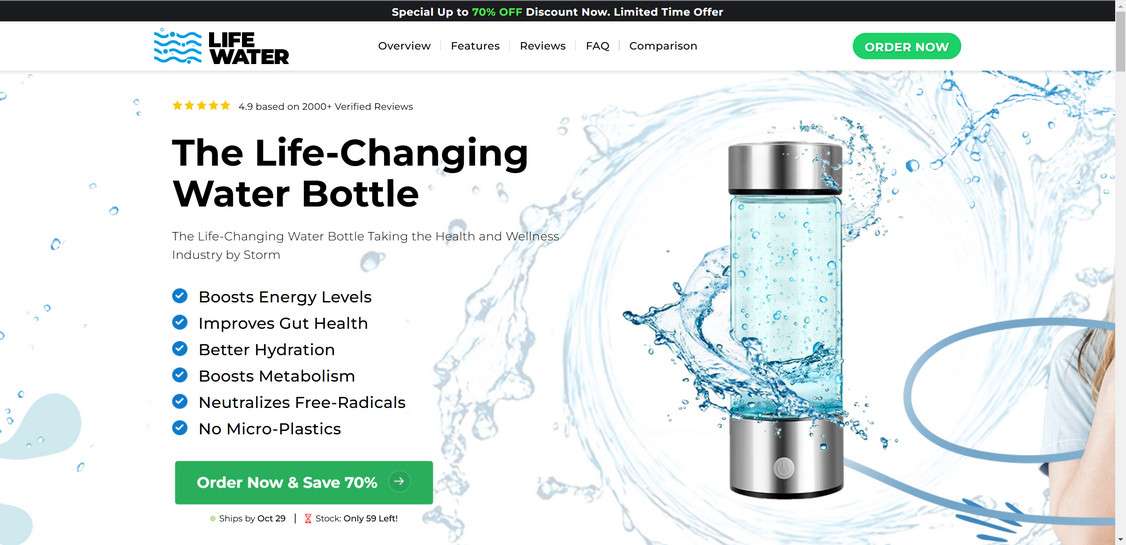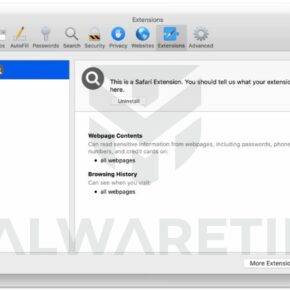A new “miracle” water bottle called LifeWater Hydrogen Bottle is being deceptively promoted online using exaggerated claims and fake discounts. This viral marketing campaign is swindling unsuspecting consumers through slick social media ads and fake review websites.
In this comprehensive guide, we will uncover everything you need to know about how this predatory scam works, spotlight the obvious red flags to watch for, and most importantly, outline how to protect yourself from getting ripped off.
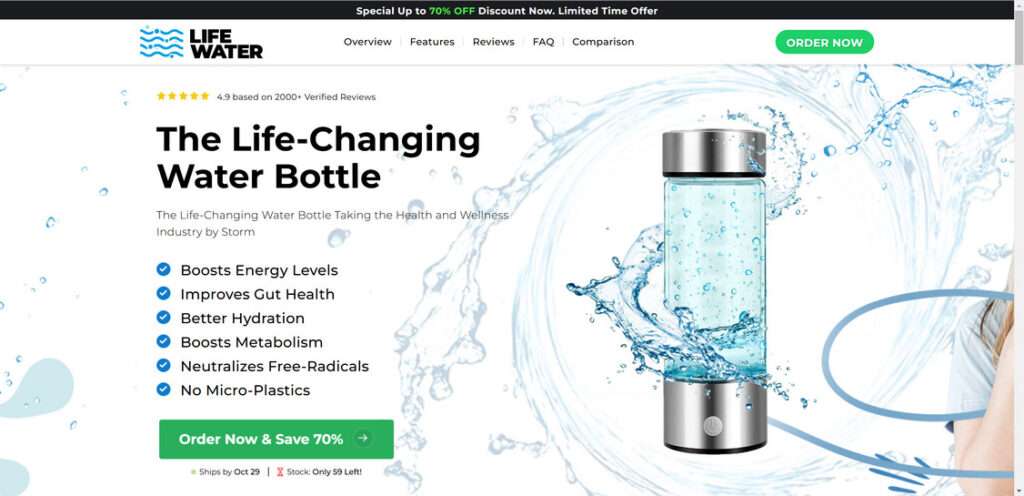
Overview of the LifeWater Hydrogen Bottle Scam
LifeWater Hydrogen Bottle is advertised as a one-of-a-kind “smart” water bottle that infuses regular water with hydrogen to provide unmatched health and hydration benefits.
The ads portray it as a revolutionary device developed by health experts that magically transforms ordinary water into a super-charged hydrogen-rich elixir. Outrageous claims are made about its germ-killing capabilities, energy boosting powers, and anti-aging properties.
To dupe consumers, dubious celebrity endorsements are used implying the product is endorsed by Fox News, Forbes and NBC News. Time-limited discounts up to 70% off are promoted to create false urgency.
In reality, LifeWater Hydrogen Bottle appears to be a $10 water bottle sold on sites like Alibaba with some basic filtering functions. The wild claims are complete fiction fabricated to scam victims out of their hard-earned money.
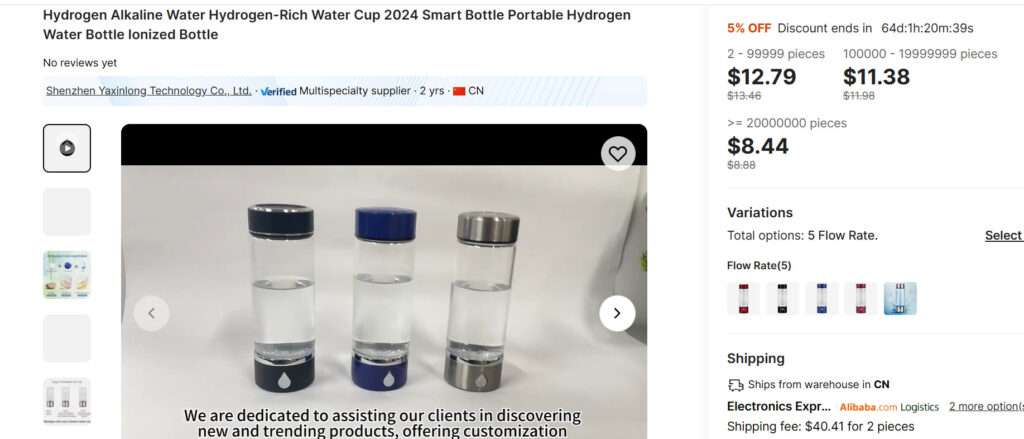
How the LifeWater Hydrogen Bottle Scam Operates
Here’s an inside look at how this devious grift works to reel in unsuspecting victims:
Step 1: Running Targeted Social Media Ads
The cornerstone of the scam is targeted ads on platforms like Facebook, Instagram and YouTube. Using personal data, the promotions are strategically displayed to those most vulnerable.
The slick videos portray LifeWater as a game-changing device that can supercharge your health through hydrogen-infused water. Fake celebrity endorsements are used to fabricate credibility.
Step 2: Fake Review Websites and Articles
To further manipulate potential buyers, the ads direct to fake review websites and blog posts touting LifeWater Hydrogen Bottle through lofty claims and fictitious customer reviews.
These promotional sites appear to provide objective proof of the product’s too-good-to-be-true capabilities. In reality, they are fabricated by the scammers themselves.
Step 3: Website Offering Bundles at Marked-up Prices
Clicking through the ads brings victims to the LifeWater website, which bombards visitors with more exaggerated claims of health benefits and anti-aging properties.
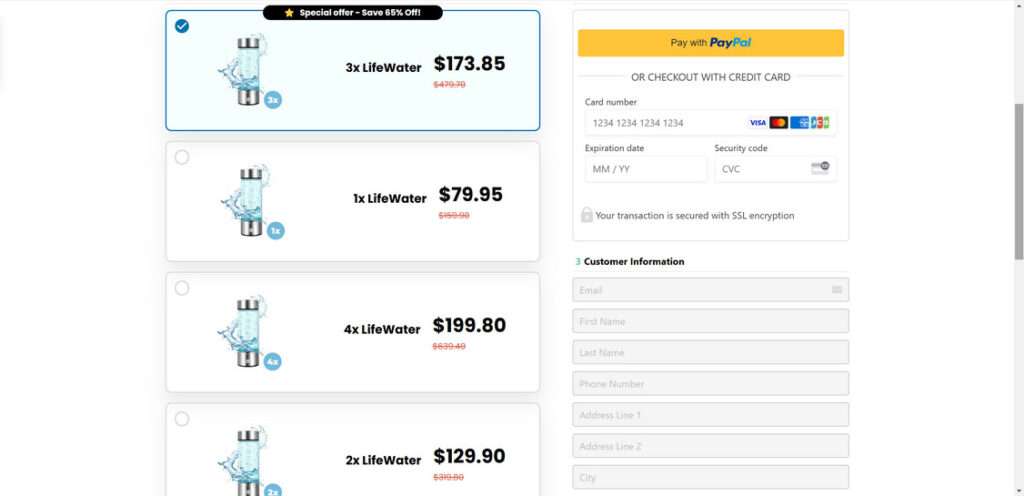
The site prominently displays special discount bundles described as exclusive deals set to expire soon. This creates a false sense of urgency to purchase before the fictional sales end.
Step 4: Fake Limited Inventory Messages
On the website, users may encounter notifications that stock is running low due to overwhelming demand. This reinforces the fabricated scarcity to compel immediate purchase.
In truth, this is just another unscrupulous tactic to prevent price comparisons and hide the insane markups from unsuspecting shoppers.
Step 5: No Refunds Allowed
Once victims receive the cheap $10 bottle lacking any unique capabilities, refunds are impossible to get.
The website and payment processor show no legitimate business details, and the bottles ship directly from China. Victims have no recourse to recoup their money.
Recognizing the Red Flags of the LifeWater Scam
When assessing any miracle health product promoted online, watch for these clear red flags indicating a likely scam:
- Social media ads – Viral ads on Facebook, Instagram and YouTube are a go-to tactic for scammers to reach a wide audience.
- Celebrity endorsements – Any claims of being endorsed by Dr. Oz, CNN or other major brands are fabricated to trick victims.
- Overly discounted prices – Don’t believe ads touting 50% off or other countdown deals creating false urgency to buy.
- Ships from China – Products that ship directly from China contradict claims of being American-made and suggest a scam.
- No company details – Research the seller but expect to find no legitimate business name, address or contact info.
- No real customer reviews – All positive reviews are fake. Authentic reviews only exist warning people it’s a scam.
- No refund policy – Avoid any site preventing refunds or making them exceedingly difficult. This signals a clear scam.
- Outrageous claims – Any product promising near-magical health benefits or anti-aging properties is certainly a scam.
What To Do if You Were Scammed by LifeWater
If you already ordered LifeWater Hydrogen Bottle and now realize it’s a scam, take the following steps immediately:
1. Contact your credit card provider to dispute the charge as fraudulent and request a chargeback refund. Provide all details and be persistent. Act fast before your chargeback rights expire.
2. Report the scam by filing reports with the FTC, BBB, FBI Internet Crime Complaint Center (IC3.gov), and anywhere else you bought or saw the product advertised.
3. Leave online reviews warning others by describing your experience with the LifeWater scam. Post on the seller’s site, social media ads, and anywhere else it is promoted.
4. Beware secondary scams where scammers pose as representatives offering to help obtain refunds, then steal more money. Never share personal information or make additional payments to anyone representing LifeWater.
5. Contact your state attorney general to file a complaint reporting the details of the scam. If enough complaints add up, legal action may be pursued to help victims.
6. Spread awareness by warning your social networks about this scam. Share your experience to help prevent others from falling victim too.
Frequently Asked Questions About the LifeWater Hydrogen Bottle Scam
1. What is the LifeWater Hydrogen Bottle?
The LifeWater Hydrogen Bottle is a cheap $10 Chinese water bottle deceptively sold through scam ads and websites using fabricated claims, fake celebrity endorsements and false discounts.
2. Does LifeWater really infuse water with hydrogen?
No. There is no actual “hydrogen infusion” occurring in the LifeWater bottle. It is a normal water bottle being marketed through lies about nonexistent hydrogen benefits.
3. Are the LifeWater discounts and bundle deals real?
Absolutely not. The fictional 70% off deals are intended to pressure victims to purchase quickly before the false discounts expire. In reality, scammers have huge supplies of $15 bottles.
4. What are the telltale signs LifeWater is a scam?
Red flags include viral social media ads, fake celebrity endorsements, unbelievable health claims, no seller details, ships from China, and preventing refunds. Use extreme caution when these tactics are present.
5. What should I do if I was scammed by LifeWater?
Immediately contact your credit card issuer to dispute the charge as fraud and request a chargeback refund. Report the scam to the FTC, BBB, IC3.gov and your state attorney general’s office.
6. Can I get a refund if I bought the LifeWater bottle?
Unfortunately no – the scammers intentionally make refunds impossible once purchased. This underscores the importance of detecting the obvious red flags before buying to avoid losing money.
7. Does LifeWater provide any unique health benefits?
No. All claims of disease-fighting properties, anti-aging effects, or other near-magical health benefits are outright fabrications intended to deceive potential victims.
8. Where can I find real LifeWater Hydrogen Bottle reviews?
All positive reviews are fake, created by the scammers themselves. Legitimate consumer feedback only exists on scam warning sites trying to expose the deception.
9. Why does the LifeWater website show limited stock?
This is a standard scam tactic to fabricate scarcity and urgency to purchase immediately. In reality, they likely have huge supplies of these cheap $15 bottles ready to ship from China.
10. How can I avoid this type of scam in the future?
Exercise great caution assessing health products promoted through social media ads using unbelievable claims, countdown discounts, celebrity endorsements and other known scam red flags.
The Reality About LifeWater Hydrogen Bottle
Now that the egregious scam tactics are exposed, here are the facts on what LifeWater Hydrogen Bottle actually provides versus the outlandish claims:
- Germ elimination – Cannot actually kill 99.99% of germs. Offers basic filtration at best.
- Energy boost – No special “energy boosting” properties. Just a normal water bottle.
- Improved hydration – Does not provide enhanced hydration over any other water bottle.
- Anti-aging effects – Absolutely no unique anti-aging benefits – just another marketing fabrication.
- Revolutionary technology – Uses cheap $10 Chinese bottle sold on sites like Alibaba – no “breakthrough” tech inside.
- Celebrity endorsements – Never featured on Dr. Oz, Fox News or anywhere else as claimed in the fake ads.
- Limited stock – Inventory is never low or selling out. Scammers likely have huge supplies ready to ship from China.
Simply put, LifeWater is a straight-up scam designed to dupe consumers using lies and deception. Don’t let them swindle another dime from innocent victims.

